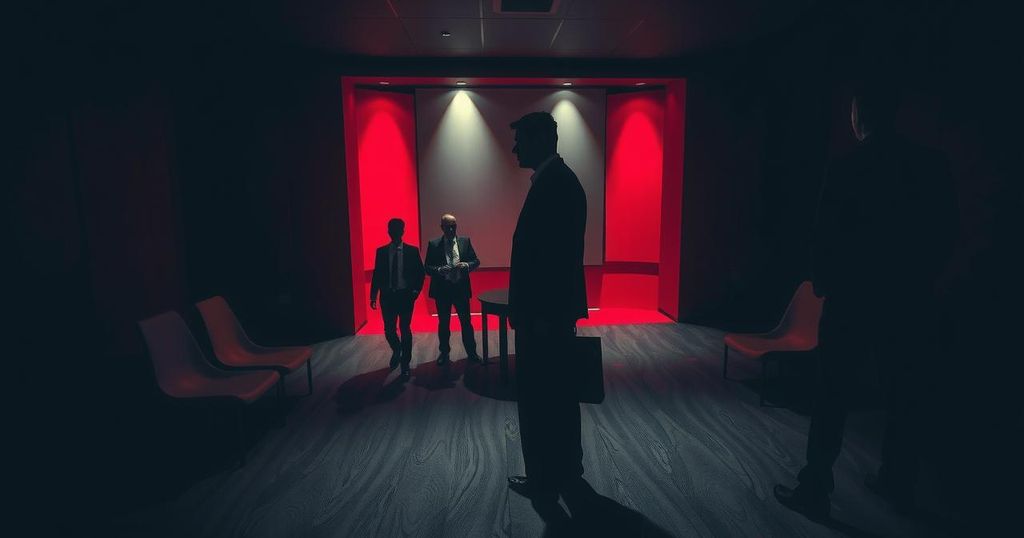A recent press conference by Zimbabwean war veterans in Bulawayo was disrupted by youths affiliated with “Youth Connect,” leading to chaos as the veterans accused them of being state agents. The veterans aimed to discuss governance issues and announce a march against corruption. Tensions with the government have escalated as they seek to assert their constitutional rights.
In Bulawayo, a recent press conference held by war veterans at the Bulawayo Media Centre was abruptly disrupted by a group of youths claiming affiliation with an organization known as Youth Connect. The veterans intended to address significant issues regarding governance in Zimbabwe and to announce a march against corruption, tribalism, and economic decline. They accused the youths of being hired personnel acting as “state agents” intent on infringing upon their rights to freedom of speech and press.
The escalating tensions between the war veterans and the government were evident, as a substantial police presence surrounded the venue, raising suspicions about the youths’ motives. Despite having planned their conference, the war veterans were faced with opposition before they could articulate their concerns. Leaders like Andreas Ethan Mathibela and Buster Magwizi voiced their frustrations at being denied the platform to express their views, questioning the legitimacy of the group interrupting them.
Magwizi expressed his disappointment, stating, “We came to the press club to address journalists… they should tell us the reason why they are stopping us.” Mathibela further demanded clarity about the intentions of the disruptive group and their alleged association with official state practices. The youths, maintaining that they had a legitimate meeting scheduled, were dismissed by the veterans and media present.
The war veterans reiterated their rights as individuals who fought in the liberation struggle, expressing anger over being obstructed. Magwizi highlighted the sacrifices made for the country, urging the youths to recognize their historical significance and the destructive nature of their actions. Mathibela warned that threats faced by the veterans due to these disruptions could lead to severe consequences.
As tensions escalated, an altercation occurred when one youth seized Mathibela’s cap, resulting in a police intervention. The veterans articulated a collective call for proper governance in Zimbabwe, criticizing the government for nurturing corruption and tribalism. They underscored their independence from political affiliations, clarifying their motivations were solely aimed at restoring freedom for all Zimbabweans.
The confrontation included serious allegations from Magwizi, who likened the situation to “Nazi operations,” and highlighted government tactics aimed at stifling dissent. Mathibela articulated their determination, asserting that despite intimidation tactics, their scheduled march would proceed, emphasizing the necessity for citizens to exercise their constitutional rights.
Amidst persistent heckling from the youths, Mathibela and his group remained resolved to continue their mission. Observers noted that some youth participants were allegedly given cash, suggesting possible incentivization by external influences. The war veterans also expressed solidarity with fellow veterans facing political persecution, as factionalism within the ruling party complicates the political landscape.
The disruptive incident reflects deep-rooted discontent among veterans of the liberation war, set against a backdrop of intense competition within the ruling party regarding future leadership, with President Emmerson Mnangagwa’s tenure set to conclude in 2028.
The press conference incident in Bulawayo underscores the fraught relationship between Zimbabwe’s war veterans and the government, highlighting the veterans’ continued struggle for political and economic freedom. Accusations of government interference and intimidation tactics resonate with a larger narrative of discontent captured in the veterans’ fight for expression and governance reform. As tensions rise, the unfolding political dynamics signal an ongoing battle for the future leadership of the country, rooted deeply in the history of the liberation struggle.
Original Source: www.zimlive.com






